The Torturous Wing Commander Poetry Department



The Torturous Wing Commander Poetry Department
Editor's note: in honor of the pop culture Behemoth that is the release of Taylor Swift's Tortured Poet's Department and the fact that it is the author's birthday and he is allowed one needlessly self-indulgent Wing Commander article per year we present to you…
One of my favorite things in popular media is finding a reference to some classic aspect of literature. Growing up, I found that it was something particularly distinctive in Star Trek. From Kirk quoting John Masefield or D.H. Lawrence to Picard's love of Shakespeare, there was something that was both enticing and approachable about these little connections to our greater culture. Such moments have always served to both elevate and contextualize the media in a way I've found incredibly satisfying. It lets you connect with characters, understand storytellers and to my liking it gives you exactly my favorite sort of guard-railed jumping off point to exploring new subjects yourself. With that in mind, I'm excited to present to you the first ever edition of the Wing Commander Combat Information Center's survey of poetry referenced in the Wing Commander canon!
Part I - What's a Paladin?
If the Wing Commander universe has an equivalent to one of Star Trek's warrior philosophers then that man is James "Paladin" Taggart. And despite what you may be thinking, Paladin's connection to the classics goes all the way back to his very introduction. The original Claw Marks magazine's description quotes him thusly:
"But when I took my commission - not too long after we discovered the Empire of Kilrah - I was just a kid. I was charged up on stories of knight-errantry, on The Death of Arthur and The Song of Roland. So when we ran into the Kilrathi, I knew I was going to grab up a lance, hop into a cockpit, and change the course of history. Naturally," he jokes, "I did."
What is Paladin talking about? The Death of Arthur is a 15th century work by Sir Thomas Malory retelling what you know as the familiar stories of King Arthur. While its sources include a number of poems it's a prose work and so doesn't actually fit the subject of our survey--but if you'd like to get further into Paladin's head then you can read it online via Project Gutenberg.
The second work mentioned, Song of Roland, is an uncredited 11th century French epic poem which tells the story of one of Charlemagne's heroic knights fighting Muslims in Spain. Roland is betrayed, martyred and avenged in the course of the story and much of the purpose of the tale is to celebrate this heroic sacrifice. Roland is doomed but he is shown to be the pinnacle of loyalty, a wise subject who will gladly suffer die rather than betray his lord. The story has been massively influential to the past thousand years of drama and it is probably referenced more often than you realize; even Wing Commander False Colors contains a disconnected reference to Roland naming a Landreich destroyed after his word, Durandel. Here's a famous example from Roland's (Rollanz) speech insisting his men must stay and battle the enemy no matter the cost:
Answers Rollanz: "God grant us then the fee!
For our King's sake well must we quit us here;
Man for his lord should suffer great disease,
Most bitter cold endure, and burning heat,
His hair and skin should offer up at need.
Now must we each lay on most hardily,
So evil songs neer sung of us shall be.
Pagans are wrong: Christians are right indeed.
Evil example will never come of me."
You can read the entire work here.
This has always been one of my favorite small pieces of world building in Wing Commander and it's something that I think Aaron Allston deserves some special credit for. It's such a brilliant implied reflection of the greater nature of the Terran Confederation. Before much of anything was ever established about this universe we already had the sense of a human culture that is tied to its cycles of historical ideation the same way ours is. Taggart and the other young men went to war at a time when Arthurian legend and other medieval tales were a strong part of their pop culture, something our own culture likes to refocus itself on every couple of generations. We understand immediately what their society regards in terms of honor, personal sacrifice and so on. Additionally, there's another brilliant lair of implied world building to the importance of these stories specifically to the man. What, after all, is the name for a Christian knight battling Muslims in this era? Paladin.
Paladin picked his callsign from this sort of material and we even see him continue to regard it in later works. Novelist Peter Telep, who you will find as we go along is a consummate English literature professor, called back the Claw Marks description in the inner monologue of Paladin's ejection in the movie novelization: "As the gray-and-white surface hurtled toward him, he told himself that he had lived a glorious life, that while he had never been an Arthur or a Roland, he rested assured that he had inspired a young heart or two."
And this scene is worth another small note on our journey: in the movie's shooting script (and in the novelization) we are given Paladin's 'last words': a quotation from Romeo and Juliet. The novelizations read: "He grinned, remembering a few lines from his schooldays: 'My mind misgives some consequence, yet hanging in the stars, shall bitterly begin his fearful date with this night's revels …'". This line was actually shot for the film but ultimately cut and we're pleased today to announce that you can now watch a reconstruction for the very first time!
The line is from the end of Act I, Scene IV of the play. Romeo is speaking on his unease with the evening and, like Paladin, foreshadowing his death (Paladin is, of course, rescued by Blair's tractor beam at the last moment). Here is the entire speech:
I fear too early, for my mind misgives
Some consequence yet hanging in the stars
Shall bitterly begin his fearful date
With this night’s revels, and expire the term
Of a despisèd life closed in my breast
By some vile forfeit of untimely death.
But he that hath the steerage of my course
Direct my sail. On, lusty gentlemen.
Does this actually go in our survey or does it just inform Paladin's connection to classical literature. Shakespeare was an accomplished poet and while it's rare to refer to his plays as poetry specifically they are written poetically rather than as prose. The more you know! Okay, okay, it's tenuous. You can read all of Romeo and Juliet here (probably for the second time if you attended an American high school).
We also continue Paladin's reputation as a man of letters in a brief scene that did make it into the movie. As Blair comes to visit him to learn what it means to be a Pilgrim we hear him listening to diegetic music! We hear a short piece of opera in Italian, translated below:
Soave sia il vento,
Tranquilla sia l'onda,
Ed ogni elemento
Benigno risponda
Ai nostri/vostri desir.
Gentle be the breeze,
Calm be the waves,
And every element
Smile in favour
On their wish.
The lines are from Mozart's Cosi fan tutte, specifically No. 10 - Trio from Scene 6 and the text is by Lorenzo Da Ponte. Such text can be written poetically, as is the case here. Così fan tutte is an 18th century opera in which a pair of husbands seek revenge on their unfaithful wives. This piece closes out the early scene in which the men leave for war and the song wishes them fair winds on their journey. In its placement in the movie, it seems to wish us the same as the story kicks off in earnest... as well as more directly serving to show us that Paladin has refined tastes despite initially seeming to be something of a scruffy looking nerf herder sort. You can find the entire libretto here.
But neither of those are the most famous time we saw Paladin and some poetry in a Wing Commander live action sequence, is it? In fact, when you saw the subject of this article this is probably the cutscene you immediately thought of. That's the Wing Commander IV interstitial in which Paladin and Taggart discuss the situation in the Border World and quote Yeats' The Second Coming together:
TOLWYN
(apologetic)
The intelligence I've managed to
collect is ... erratic ...
unreliable...
(beat)
'Things fall apart; the center
cannot hold; Mere anarchy is
loosed upon the world... The
best lack all conviction...'
HE SLAMS HIS FIST ON THE DESK IN ANGER AND FRUSTRATION.
PALADIN
(picking up the quote)
'And what rough beast...Slouches
towards Bethlehem to be born?'
(beat)
You're still not certain who's
behind the troubles then?
The Second Coming is a very famous poem that Yeats wrote in 1919 which reflects the tumultuous situation in his world: the great losses coming out of World War I, the beginning of Ireland's war for independence and the ongoing specter of a horrific pandemic. If there's a reason the work speaks to you today it's probably because the massive anxieties Yeats faced in his world are pretty darned similar to the ones we all manage today! Similarly, beyond Tolwyn's literal (and petty! and SIMPLE!) dig at Blair, the situation described in Yeats' lines matches very well the question and upheaval being experienced in 2673 amidst the Border Worlds crisis. And of course Tolwyn's choice of poems betrays him: it is not Blair who lacks conviction but Tolwyn himself who is the worst and full of passionate intensity.
Turning and turning in the widening gyre
The falcon cannot hear the falconer;
Things fall apart; the centre cannot hold;
Mere anarchy is loosed upon the world,
The blood-dimmed tide is loosed, and everywhere
The ceremony of innocence is drowned;
The best lack all conviction, while the worst
Are full of passionate intensity.
Surely some revelation is at hand;
Surely the Second Coming is at hand.
The Second Coming! Hardly are those words out
When a vast image out of Spiritus Mundi
Troubles my sight: somewhere in sands of the desert
A shape with lion body and the head of a man,
A gaze blank and pitiless as the sun,
Is moving its slow thighs, while all about it
Reel shadows of the indignant desert birds.
The darkness drops again; but now I know
That twenty centuries of stony sleep
Were vexed to nightmare by a rocking cradle,
And what rough beast, its hour come round at last,
Slouches towards Bethlehem to be born?
Peter Telep, again ever the English major, pays tribute to this nod in Wing Commander Pilgrim Truth by having Yeats quote an older Yeats poem as he is being mentally tortured by a Kilrathi interrogator: "At least the Kilrathi had not stolen his gift to dream. What had the poet Yeats written about dreams? 'But I, being poor, have only my dreams; / I have spread my dreams under your feet; / Tread softly because you tread on my dreams.'" The poem is Aedh Wishes for the Cloths of Heaven from 1899.
Enwrought with golden and silver light,
The blue and the dim and the dark cloths
Of night and light and the half light,
I would spread the cloths under your feet:
But I, being poor, have only my dreams;
I have spread my dreams under your feet;
Tread softly because you tread on my dreams.
What's the connection to the story, other than the seemingly literal mention of dreams? Yeats' Aedh is a weak man in the thrall of a tempestuous woman whose threatens to destroy his very self… exactly Paladin's situation in Pilgrim Truth, embroiled with his terrorist pair Amity Aristee (aren't movie novel descriptions weird when you haven't read them?).
One more poem plays a particularly important role in the unpublished Wing Commander novel. Blair and Paladin have been separated for the entire story but Blair has been receiving unusual communications from Merlin. In the story's climax we learn that these actually originate from Paladin and take the form of a particular quote:
"No, she's not. Honestly, I don't know where she is. I finally destroyed the Olympus. The rest is long a story better told over drinks. In the end, we were taken like you. I woke up here. I've been looking for her and the protur ever since. And I don't know about you, but being here gives me this strong sense of--I'm not sure what it is--home, maybe. Never weather-beaten sail more willing bent to shore."The line is the opening of Campion's poem referred to by the same name:
"I've heard that. Merlin said that when--"
"That was me. Or more precisely, that was me quoting an old poet named Thomas Campion. I wanted to tell you more, but we got cut off. I'm not an extrakinetic, Mr. Blair. But being here somehow heightens that ability. It's remarkable, really."
Never weather-beaten sail more willing bent to shore,
never tired pilgrim limbs affected slumber more,
Than my weary spirit now longs to fly out of my troubled breast:
O come quickly, sweetest Lord, and take my soul to rest!
Ever blooming are the joys of heav'n's high Paradise,
Old age deafs not there our ears nor vapour dims our eyes:
Glory there the sun outshines; whose beams the Blessèd only see:
O come quickly, come quickly, glorious Lord, and raise my soul to Thee!
Campion was popular in his day but fell out of favor in the ensuing centuries. His work eventually found a second life for its compositional nature, with works like this one frequently being adopted as hymns today. The connection to Pilgrim Truth is twofold: the poem itself is an apt summary of Blair and Paladin's long and varied journey through the movie novels (on the order of 'what a long strange trip its been') and of course the unspoken second line makes it a gentlemanly joke on the name chosen for the "Pilgrims".
Part II - Let's Go Kipling (Get Your Kipler)
Stepping back to the beginning, we're going to go through some of the classic poets and poems referenced in the games and books. And that starts with the unusual name for the Tiger's Claw's sister ship introduced way back in Claw Marks: the TCS Kipling. Said to be the second Bengal (retcon alert: the second flight II Bengal), the Kipling appears in a bit of trivia about how design changes meant that it is ten meters shorter than the Tiger's Claw (making your home carrier the largest ship in the fleet… retcon: not at all the largest in the fleet). The Kipling is named after 19th century British poet Rudyard Kipling, likely best known today as the author of The Jungle Book.
It's an unusual name for a 27th century space carrier. While Kipling is certainly associated with British patriotism he wasn't a military hero himself and so would be an unlikely choice to honor with a warship today. He's also not someone you would particularly reference today as his more racist views have pushed him further out of the canon, noticeably more so even since 1990. But I think that this all speaks to Wing Commander's origins as less of a stand-in for present day history (the navy but in space!) and more of an imagined future borrowing from the likes of Robotech. (There does seem to be an implied theme with those early names: it's hard to articulate, but Kipling's strong connection to India and its jungles in particular seems to go thematically alongside ships named Bengal and Tiger's Claw. The internal series bible later touched on this 'cat connection' in a retcon: Bengals built earlier were named after cats but later ships (like End Run's Wolfhounds) are named after 'canines'. This story, which dates to early 1991, actually fits better with the movie-introduced backstory that says Bengals predate the war by fifteen years. Of course, later sources introduce Bengals named after neither!
Interestingly it's not the only the TCS Kipling that references old Rudyard. Wing Commander II has a second ship which is named after one of his most famous poems: the TCS Gunga Din. The Gunga Din is a Clydesdale-class ship equipped as a minesweeper which appears in Ghorah Khar (winning) mission C. Blair and Hobbes are sent to fend off a Kilrathi attack on Olympus and while en route they pick up bombers to escort that had been previously assigned to protect the Gunga Din. That's fascinating for all sorts of Wing Commander reasons. The Gunga Din's existence is purely texture, there's no gameplay purpose to having it there beyond that it makes the mission itself seem like part of a living world. Chris Roberts' immersion techniques at their finest, least noticeable! And you just have to love when the game makes a ship more varied; instead of a transport, we learn (and accept) in an instant that Clydesdales can also be used to navigate minefields. The series does this with limited assets quite a bit, including using the Clarkson-class transports in Wing Commander III as minelayers in the 3DO port! Or making Paladin's frigate a destroyer named Frigate in the PC version…
You may talk o’ gin and beer
When you’re quartered safe out ’ere,
An’ you’re sent to penny-fights an’ Aldershot it;
But when it comes to slaughter
You will do your work on water,
An’ you’ll lick the bloomin’ boots of ’im that’s got it.
Now in Injia’s sunny clime,
Where I used to spend my time
A-servin’ of ’Er Majesty the Queen,
Of all them blackfaced crew
The finest man I knew
Was our regimental bhisti, Gunga Din,
He was ‘Din! Din! Din!
‘You limpin’ lump o’ brick-dust, Gunga Din!
‘Hi! Slippy hitherao
‘Water, get it! Panee lao,
‘You squidgy-nosed old idol, Gunga Din.’
The uniform ’e wore
Was nothin’ much before,
An’ rather less than ’arf o’ that be’ind,
For a piece o’ twisty rag
An’ a goatskin water-bag
Was all the field-equipment ’e could find.
When the sweatin’ troop-train lay
In a sidin’ through the day,
Where the ’eat would make your bloomin’ eyebrows crawl,
We shouted ‘Harry By!’
Till our throats were bricky-dry,
Then we wopped ’im ’cause ’e couldn’t serve us all.
It was ‘Din! Din! Din!
‘You ’eathen, where the mischief ’ave you been?
‘You put some juldee in it
‘Or I’ll marrow you this minute
‘If you don’t fill up my helmet, Gunga Din!’
’E would dot an’ carry one
Till the longest day was done;
An’ ’e didn’t seem to know the use o’ fear.
If we charged or broke or cut,
You could bet your bloomin’ nut,
’E’d be waitin’ fifty paces right flank rear.
With ’is mussick on ’is back,
’E would skip with our attack,
An’ watch us till the bugles made 'Retire,’
An’ for all ’is dirty ’ide
’E was white, clear white, inside
When ’e went to tend the wounded under fire!
It was ‘Din! Din! Din!’
With the bullets kickin’ dust-spots on the green.
When the cartridges ran out,
You could hear the front-ranks shout,
‘Hi! ammunition-mules an' Gunga Din!’
I shan’t forgit the night
When I dropped be’ind the fight
With a bullet where my belt-plate should ’a’ been.
I was chokin’ mad with thirst,
An’ the man that spied me first
Was our good old grinnin’, gruntin’ Gunga Din.
’E lifted up my ’ead,
An’ he plugged me where I bled,
An’ ’e guv me ’arf-a-pint o’ water green.
It was crawlin’ and it stunk,
But of all the drinks I’ve drunk,
I’m gratefullest to one from Gunga Din.
It was 'Din! Din! Din!
‘’Ere’s a beggar with a bullet through ’is spleen;
‘’E's chawin’ up the ground,
‘An’ ’e’s kickin’ all around:
‘For Gawd’s sake git the water, Gunga Din!’
’E carried me away
To where a dooli lay,
An’ a bullet come an’ drilled the beggar clean.
’E put me safe inside,
An’ just before ’e died,
'I ’ope you liked your drink,’ sez Gunga Din.
So I’ll meet ’im later on
At the place where ’e is gone—
Where it’s always double drill and no canteen.
’E’ll be squattin’ on the coals
Givin’ drink to poor damned souls,
An’ I’ll get a swig in hell from Gunga Din!
Yes, Din! Din! Din!
You Lazarushian-leather Gunga Din!
Though I’ve belted you and flayed you,
By the livin’ Gawd that made you,
You’re a better man than I am, Gunga Din!
Gunga Din is told from the point of view of a British soldier serving in India as he comes to realize the heroism of his doomed water carrier, Gunga Din. The final line, you're a better man than I am, Gunga Din!, is a punch in the gut as the speaker comes to see that the man he considered his inferior was not. It's a very famous quote and suggests there's a bit more to Kipling than the racist caricature he's increasingly portrayed as today. But why choose the name for a ship? It's a bit of a mystery, especially since other Clydesdales in the game are used as interactive tanker ships which WOULD make a lot of sense as something to be named after a water carrier. And before you say it's a minesweeper instead because some subtle writers thought that would be too on the nose, one of the Clydesdales we do see as a tanker is the TCS Valdez...
But that's not the end of all our Kiplingling! We've mentioned that Wing Commander noveist Peter Telep is an English professor with a master for working in subtle references… but he's nothing compared to the late Christopher Stasheff, the author of Milk Run (the setup novella that precedes William Forstchen's End Run). Stasheff was a prolific author whose output was full of tongue-in-cheek English major SF, including a well regarded series about a space-traveling theater troupe. The story concludes with Captain Harcourt quoting another poem of Kipling's that speaks to the loss of Ramona at Vukar Tag and the overall war with the Kilrathi:
Whatever it was on Vukar Tag that the Cats guarded so closely, the Admiralty would find some way to use it against them.
Kipling’s lines echoed in his head:
If there should follow a thousand swords
To carry my bones away,
Belike the price of a jackal’s meal
Were more than a thief could pay.
Oh, the Kilrathi were thieves, all right—very vicious, but very competent, thieves—and the revenge for Ramona would follow.
Oh, yes, the revenge would follow.
The poem quoted here is The Ballad of East and West, an 1889 story about another British officer in India who bravely faces off against a tribal chieftain. The two battle but then come to respect each other, recognizing that while their philosophies oppose one another that they are ultimately the same type of noble man.
Oh, East is East, and West is West, and never the twain shall meet,That's not the only time the short story quotes a classic poem! In the previous scene, Romana sees a glimpse of the Kilrathi castle on Vukar Tag and quotes the last five lines of Percey Shelley's famous Ozymandias.
Till Earth and Sky stand presently at God's great Judgment Seat;
But there is neither East nor West, Border, nor Breed, nor Birth,
When two strong men stand face to face, though they come from the ends of the earth!
Kamal is out with twenty men to raise the Border side,
And he has lifted the Colonel's mare that is the Colonel's pride.
He has lifted her out of the stable-door between the dawn and day
And turned the calkins upon her feet, and ridden her far away.
Then up and spoke the Colonel's son that led a troop of the Guides
Is there never a man of all my men can say where Kamal hides? "
Then up and spoke Mohammed Khan, the son of the Ressaldar:
"If ye know the track of the morning-mist, ye know where his pickets are.
"At dusk he harries the Abazai - at dawn he is into Bonair,
"But he must go by Fort Bukloh to his own place to fare.
"So if ye gallop to Fort Bukloh as fast as a bird can fly,
"By the favour of God ye may cut him off ere he win to the Tongue of Jagai.
"But if he be past the Tongue of Jagai, right swiftly turn ye then,
"For the length and the breadth of that grisly plain is sown with Kamal's men.
"There is rock to the left, and rock to the right, and low lean thorn between,
"And ye may hear a breech-bolt snick where never a man is seen."
The Colonel's son has taken horse, and a raw rough dun was he,
With the mouth of a bell and the heart of Hell and the head of a gallows-tree.
The Colonel's son to the Fort has won, they bid him stay to eat
Who rides at the tail of a Border thief, he sits not long at his meat.
He's up and away from Fort Bukloh as fast as he can fly,
Till he was aware of his father's mare in the gut of the Tongue of Jagai,
Till he was aware of his father's mare with Kamal upon her back,
And when he could spy the white of her eye, he made the Pistol crack.
He has fired once, he has fired twice, but the whistling ball went wide.
Ye shoot like a soldier," Kamal said. " Show now if ye can ride!
It's up and over the Tongue of Jagai, as blown dust-devils go
The dun he fled like a stag of ten, but the mare like a barren doe.
The dun he leaned against the bit and slugged his head above,
But the red mare played with the snaffle-bars, as a maiden plays with a glove.
There was rock to the left and rock to the right, and low lean thorn between,
And thrice he heard a breech-bolt snick tho' never a man was seen.
They have ridden the low moon out of the sky, their hoofs drum up the dawn,
The dun he went like a wounded bull, but the mare like a new-roused fawn.
The dun he fell at a water-course - in a woeful heap fell he,
And Kamal has turned the red mare back, and pulled the rider free.
He has knocked the pistol out of his hand - small room was there to strive,
'Twas only by favour of mine," quoth he, " ye rode so long alive:
"There was not a rock for twenty mile, there was not a clump of tree,
"But covered a man of my own men with his rifle cocked on his knee.
"If I had raised my bridle-hand, as I have held it low,
"The little jackals that flee so fast were feasting all in a row.
"If I had bowed my head on my breast, as I have held it high,
"The kite that whistles above us now were gorged till she could not fly."
Lightly answered the Colonel's son: "Do good to bird and beast,
"But count who come for the broken meats before thou makest a feast.
"If there should follow a thousand swords to carry my bones away.
"Belike the price of a jackal's meal were more than a thief could pay.
"They will feed their horse on the standing crop, their men on the garnered grain.
"The thatch of the byres will serve their fires when all the cattle are slain.
"But if thou thinkest the price be fair - thy brethren wait to sup,
"The hound is kin to the jackal-spawn - howl, dog, and call them up!
"And if thou thinkest the price be high, in steer and gear and stack,
"Give me my father's mare again, and I'll fight my own way back! "
Kamal has gripped him by the hand and set him upon his feet.
"No talk shall be of dogs," said he, "when wolf and grey wolf meet.
"May I eat dirt if thou hast hurt of me in deed or breath;
"What dam of lances brought thee forth to jest at the dawn with Death?"
Lightly answered the Colonel's son: " I hold by the blood of my clan:
Take up the mare for my father's gift - by God, she has carried a man!"
The red mare ran to the Colonel's son, and nuzzled against his breast;
"We be two strong men," said Kamal then, " but she loveth the younger best.
"So she shall go with a lifter's dower, my turquoise-studded rein,
"My 'broidered saddle and saddle-cloth, and silver stirrup twain."
The Colonel's son a pistol drew, and held it muzzle-end,
"Ye have taken the one from a foe," said he. " Will ye take the mate from a friend? "
"A gift for a gift," said Kamal straight; "a limb for the risk of a limb.
"Thy father has sent his son to me, I'll send my son to him!"
With that he whistled his only son, that dropped from a mountain-crest
He trod the ling like a buck in spring, and he looked like a lance in rest.
"Now here is thy master," Kamal said, "who leads a troop of the Guides,
"And thou must ride at his left side as shield on shoulder rides.
"Till Death or I cut loose the tie, at camp and board and bed,
"Thy life is his - thy fate it is to guard him with thy head.
"So, thou must eat the White Queen's meat, and all her foes are thine,
"And thou must harry thy father's hold for the peace of the Border-line.
"And thou must make a trooper tough and hack thy way to power
"Belike they will raise thee to Ressaldar when I am hanged in Peshawur! "
They have looked each other between the eyes, and there they found no fault.
They have taken the Oath of the Brother-in-Blood on leavened bread and salt:
They have taken the Oath of the Brother-in-Blood on fire and fresh-cut sod,
On the hilt and the haft of the Khyber knife, and the Wondrous Names of God.
The Colonel's son he rides the mare and Kamal's boy the dun,
And two have come back to Fort Bukloh where there went forth but one.
And when they drew to the Quarter-Guard, full twenty swords flew clear
There was not a man but carried his feud with the blood of the mountaineer.
Ha' done! ha' done! " said the Colonel's son. " Put up the steel at your sides!
Last night ye had struck at a Border thief - to-night 't is a man of the Guides!
Oh, East is East, and West is West, and never the twain shall meet,
Till Earth and Sky stand presently at God's great Judgment Seat;
But there is neither East nor West, Border, nor Breed, nor Birth,
When two strong men stand face to face though they come from the ends of the earth!
I met a traveller from an antique land,
Who said—“Two vast and trunkless legs of stone
Stand in the desert. . . . Near them, on the sand,
Half sunk a shattered visage lies, whose frown,
And wrinkled lip, and sneer of cold command,
Tell that its sculptor well those passions read
Which yet survive, stamped on these lifeless things,
The hand that mocked them, and the heart that fed;
And on the pedestal, these words appear:
My name is Ozymandias, King of Kings;
Look on my Works, ye Mighty, and despair!
Nothing beside remains. Round the decay
Of that colossal Wreck, boundless and bare
The lone and level sands stretch far away.”
In the context of the story this sets her as parallel to Harcourt, with whom she had butted heads until this moment; both end their tales (hers tragically) with a poem. Ozymandias was written about seventy years before The Ballad of East and West, the result of a bit of a contest between Shelley and another poet to compose lines on the subject of an Egyptian pillar being displayed in London. It is often used in pop culture today with a sort of a 'pride before a fall' read to it. Historically that's not a great read (Ozymandias was another name for Ramesses II, who is certainly known) but it is certainly the common one today. Classicist Stasheff, however, is using it with the original understanding, to contemplate something sublimely out of place and free of context (which is also important setup as the Kilrathi castle in question will play a sudden role in the following story).
There's also a blink-and-you-miss it joke at the start of Milk Run when the Johnny Greene arrives at Hilo Base but finds they have been reassigned:
“Yeah, we have a week’s oxygen left,” Harcourt growled. “Captain Macmillan Harcourt here. We’ve been standing picket duty for two years, and my crew is going crazy for some R&R while their ship is being repaired. What’s the problem, Xanadu?”
“Only orders, Captain Harcourt—signed by Admiral Banbridge.”
Harcourt stiffened. That was coming from awfully high up. Why was Banbridge concerning himself with a lowly corvette?
“Orders are to divert to Hilo Base,” Xanadu said.
“Hilo Base?” Harcourt turned to the astrogator. “Where’s that, Barney?”
Barney scanned the chart on his screen, shook his head. “Nothing I ever heard of, Captain. I’ll scan.” He punched the name into the computer.
Harcourt decided to help him a little. “Coordinates for Hilo Base, please, Xanadu?”
“It’s not on any of our charts,” Barney reported.
“Thirty-two degrees right ascension, seventy-two degrees east,” Xanadu replied. “Sixteen light-years outward.”
“Thirty-two, seventy-two, sixteen,” Barney echoed, punching the numbers into his computer.
Then tension on the bridge fairly thrummed. Everybody stared at the astrogator.
“Yeah, it’s there.” Barney shook his head. “I wouldn’t call that much of a world, Captain. Says it has a couple of big lakes, though, and an inland sea. Plus, a couple of R&R domes.”
The joke here is so extremely stupid in the funniest way: the base they're at is XANADU and they are being sent instead to another base that has "a couple of R&R domes". This is a very elaborate setup to play on the opening of Samuel Taylor Coleridge's wonderful Kubla Khan:
Or, a vision in a dream. A Fragment.
In Xanadu did Kubla Khan
A stately pleasure-dome decree:
Where Alph, the sacred river, ran
Through caverns measureless to man
Down to a sunless sea.
So twice five miles of fertile ground
With walls and towers were girdled round;
And there were gardens bright with sinuous rills,
Where blossomed many an incense-bearing tree;
And here were forests ancient as the hills,
Enfolding sunny spots of greenery.
But oh! that deep romantic chasm which slanted
Down the green hill athwart a cedarn cover!
A savage place! as holy and enchanted
As e’er beneath a waning moon was haunted
By woman wailing for her demon-lover!
And from this chasm, with ceaseless turmoil seething,
As if this earth in fast thick pants were breathing,
A mighty fountain momently was forced:
Amid whose swift half-intermitted burst
Huge fragments vaulted like rebounding hail,
Or chaffy grain beneath the thresher’s flail:
And mid these dancing rocks at once and ever
It flung up momently the sacred river.
Five miles meandering with a mazy motion
Through wood and dale the sacred river ran,
Then reached the caverns measureless to man,
And sank in tumult to a lifeless ocean;
And ’mid this tumult Kubla heard from far
Ancestral voices prophesying war!
The shadow of the dome of pleasure
Floated midway on the waves;
Where was heard the mingled measure
From the fountain and the caves.
It was a miracle of rare device,
A sunny pleasure-dome with caves of ice!
A damsel with a dulcimer
In a vision once I saw:
It was an Abyssinian maid
And on her dulcimer she played,
Singing of Mount Abora.
Could I revive within me
Her symphony and song,
To such a deep delight ’twould win me,
That with music loud and long,
I would build that dome in air,
That sunny dome! those caves of ice!
And all who heard should see them there,
And all should cry, Beware! Beware!
His flashing eyes, his floating hair!
Weave a circle round him thrice,
And close your eyes with holy dread
For he on honey-dew hath fed,
And drunk the milk of Paradise.
Poetry jokes don't just happen in the background, though. Colonel Blair gets to make one himself in the novelization of Wing Commander III. One subplot of the novel, introduced from Andrew Keith's own experience with aircraft carrier operations, is Blair's plan to use the TCS Victory's shuttles to refuel his patrols while in flight (later made a standard part of the game with the TCS Redeemer in Wing Commander Prophecy!). At one point he has a jokey conversation with one of these shuttle pilots during a refueling:
When it was finally over, Blair released the hose and watched it reel into the shuttle before applying reverse thrusters to edge the Thunderbolt away. "Watchdog Leader to Shuttle Hardy. Thanks for a wonderful time. But I'm not always this easy on a first date, y'know?"
The shuttle's pilot chuckled. "You mean you're not going to stick around and cuddle? You flyboys are all alike." There was a pause. "Nail a couple of kitty-cats for us, Colonel, since we can't be in the shooting."
"They also serve who only stand and pump fuel, Hardy," Blair misquoted. "You just keep our people flying."
The poem he is misquoting is Milton's famed sonnet on his blindness:
When I consider how my light is spent,
Ere half my days, in this dark world and wide,
And that one Talent which is death to hide
Lodged with me useless, though my Soul more bent
To serve therewith my Maker, and present
My true account, lest he returning chide;
“Doth God exact day-labour, light denied?”
I fondly ask. But patience, to prevent
That murmur, soon replies, “God doth not need
Either man’s work or his own gifts; who best
Bear his mild yoke, they serve him best. His state
Is Kingly. Thousands at his bidding speed
And post o’er Land and Ocean without rest:
They also serve who only stand and wait.”
Here Milton asks God why he was blinded early in life when there is so much left that he could accomplish in his name. God replies that he has endless people who serve him and he doesn't need any one to do anything exceptional beyond suffer the indignities of life. As someone who lost his vision early in life as well it has always meant something special to me!
Origin's Official Guide to Wing Commander III has another odd one. One of its interstitial TCN stories (NOT one from the game's script!) tells the story of a solar ring station ransacked by the Kilrathi which is named La Bella [sic] Dame sans Merci. This is a somewhat unexpected reference to a John Keats ballad of the same name:
O what can ail thee, knight-at-arms,
Alone and palely loitering?
The sedge has withered from the lake,
And no birds sing.
O what can ail thee, knight-at-arms,
So haggard and so woe-begone?
The squirrel’s granary is full,
And the harvest’s done.
I see a lily on thy brow,
With anguish moist and fever-dew,
And on thy cheeks a fading rose
Fast withereth too.
I met a lady in the meads,
Full beautiful—a faery’s child,
Her hair was long, her foot was light,
And her eyes were wild.
I made a garland for her head,
And bracelets too, and fragrant zone;
She looked at me as she did love,
And made sweet moan
I set her on my pacing steed,
And nothing else saw all day long,
For sidelong would she bend, and sing
A faery’s song.
She found me roots of relish sweet,
And honey wild, and manna-dew,
And sure in language strange she said—
‘I love thee true’.
She took me to her Elfin grot,
And there she wept and sighed full sore,
And there I shut her wild wild eyes
With kisses four.
And there she lullèd me asleep,
And there I dreamed—Ah! woe betide!—
The latest dream I ever dreamt
On the cold hill side.
I saw pale kings and princes too,
Pale warriors, death-pale were they all;
They cried—‘La Belle Dame sans Merci
Thee hath in thrall!’
I saw their starved lips in the gloam,
With horrid warning gapèd wide,
And I awoke and found me here,
On the cold hill’s side.
And this is why I sojourn here,
Alone and palely loitering,
Though the sedge is withered from the lake,
And no birds sing.
The poem tells the story of a knight seduced to his doom by a dark fairy, expressing the feelings of every man who was has ever felt doomed by a woman (they spoke with a little more class about such things back then!).
We will close out this section with one more poem from Peter Telep in Pilgrim Truth… or rather, the Pilgrim Truth outline, which was published online way back in 2000 when HarperEntertainment declined to put out the book itself. Older readers may remember the campaign to help review Telep's Red Planet novel in exchange for the document! The outline ends with two quotations not found in the book itself:
"Blueness doth express trueness."
Ben Jonson (1573-1637), English dramatist, poet. Amorphus, in Cynthia's Revels, act 5, sc. 2.
"Truth is always congruous and agrees with itself; every truth in the universe agrees with all others."
Daniel Webster (1782-1852)
Webster was a 19th century American politician of great renown but Johnson was, as noted, an English poet. The quote here is actually prose, taken from a play; it is a reference to the mysterious blue energy that continues to appear to characters throughout the novels (it turns out to be magic Pilgrims). You can read the entire play here.
Part III - Batter My heart, Three-Person'd System
Privateer 2's Tri-System is a bit of an odd case because the lore would imply that even if the inhabitants are humans (humanoids?) then their culture should be totally distinct from that of Earth and the Terran Confederation… but on the ground the reality is very different, with endless common cultural references, from big Texan sheriffs to seemingly endless planets and moons named after the Greek pantheon. One of the great things about Privateer 2 (everyone boos) is that it expands the universe to show you elements of the future culture you would never otherwise think about. Whether you like or lump that the Tri-System is full of extremely weird Douglas Adams-style science fiction it's a totally different point of view than we see in the mostly-military focused Wing Commander games. So I call it a win that there's a Wing Commander game that has, you guessed it, a poetry correspondent.
That's right, there's a running gag in Privateer 2's booth entry news stories where a disaster happens and the only person available to cover it is Crius Net's "poetry correspondent" Toni Cowey who writes all of his updates in verse instead of prose. And these stories impact the game just like many of the others, representing things like a discount on sex robots or that a disaster has raised the price of artificial optic nerves on Hephaestus (because of dumbasses looking at an eclipse; topical!). Here's the eclipse poem:
Alas!
'Tis a day of woe for the sorry folk of Hephaestus.
Suffering has cast it's shady hand upon the brow of many,
while foul misunderstanding has bereft the common man of sight.
The cause? The cause?
Bewail the man, bewail the foe,
whose fellows he has blighted so.
It was the day of the eclipse,
an event on men and women's lips,
when foul Misfortune did conspire,
the TV computers to miswire.
And thus, instead of smoked glass,
the order now did come to pass,
that Magnifiers should be used,
an act which retinas abused.
Now men are blind and cannot see,
and Optic Nerves are of rarity.
I thank you.
The other article is even more interesting because the poem itself is a parody of a real one! Here's Toni Cowey's "To His Toy Mistress…" which reports on a pleasure borg discount on Hades (the prison planet? What exactly is going on here?):
Behold, for Pleasure Borgs are free.
A-wandering round the galaxy.
Who set them loose I cannot say.
It happened on Hades one day.
These sexy droids are now for sale.
But the joke here is also that the poem's title is a pun on Andrew Marvell's To His Coy Mistress, a classic in which the author tries to seduce a woman:
Had we but world enough and time,
This coyness, lady, were no crime.
We would sit down, and think which way
To walk, and pass our long love’s day.
Thou by the Indian Ganges’ side
Shouldst rubies find; I by the tide
Of Humber would complain. I would
Love you ten years before the flood,
And you should, if you please, refuse
Till the conversion of the Jews.
My vegetable love should grow
Vaster than empires and more slow;
An hundred years should go to praise
Thine eyes, and on thy forehead gaze;
Two hundred to adore each breast,
But thirty thousand to the rest;
An age at least to every part,
And the last age should show your heart.
For, lady, you deserve this state,
Nor would I love at lower rate.
But at my back I always hear
Time’s wingèd chariot hurrying near;
And yonder all before us lie
Deserts of vast eternity.
Thy beauty shall no more be found;
Nor, in thy marble vault, shall sound
My echoing song; then worms shall try
That long-preserved virginity,
And your quaint honour turn to dust,
And into ashes all my lust;
The grave’s a fine and private place,
But none, I think, do there embrace.
Now therefore, while the youthful hue
Sits on thy skin like morning dew,
And while thy willing soul transpires
At every pore with instant fires,
Now let us sport us while we may,
And now, like amorous birds of prey,
Rather at once our time devour
Than languish in his slow-chapped power.
Let us roll all our strength and all
Our sweetness up into one ball,
And tear our pleasures with rough strife
Through the iron gates of life:
Thus, though we cannot make our sun
Stand still, yet we will make him run.
Toni isn't the only inhabitant of the Tri-System with a poetic bent. SCORPIO, the awful serial killer who stars in perhaps the game's most hated mission (and I would argue its most compelling!) begins his second 'clue' with a bit of verse that should be familiar to just about everyone:
I just want a little respect, that's all, but oh no, you're so high and mighty. Anyway…
Roses are red,
Violets are blue,
Here's clue number two,
Just for you,
Everyday the heads of the CIS Special Ops. division sit down to have a meeting. Each day the division heads take up different places at the four seater table.
If there are four division heads, how many days will it take before all the different combinations are exhausted ?
Roses are red isn't just an easily parodied schoolyard rhyme from your youth; its origins trace all the way back to the 16th century where an early iteration appears in Spenser's The Faerie Queene. But how does our killer know that...
We also see a few mentions of contemporary poets in the Tri-System media so we know that the job is apparently alive and well (and still looked down on by your average joe). One is the in-game description of wingmate Cinquante Delores who is said to have once been married to a poet:
Originally an inter system translator for the diplomatic core, she ditched the 9 to 5 in favour of living on the edge as a gun for hire. Her diminutive stature belies her ability; her father was the legendary cruiser captain Pietr Velasquez Delores, and she learnt combat skills at his knee, only to put it all aside to marry a Hephaestan ex-poet. Following his death in a shaving accident, she returned to her original vocation, where she is a solid, dependable and reassuringly natural blonde wingwoman.
The unnamed poet husband's unusual cause of death is likely (and oddly) a reference to John Thoreau, the brother of American writer Henry David Thoreau. John died from an jury suffered while shaving which devastated his brother and prompted Ralph Waldo Emerson to suggest that he clear his mind by escaping to nature. The result of that was Walden in another of those famous 'want of a nail' situations.
Privateer 2's official guide also mentions poetry at large as one of the distinctive features of one of Privateer's otherwise ubiquitous repair stations, Bestinium. For whatever reason, the base is said to be a center for creatives including poets! Interesting flavor:
Bestinium, otherwise known as "Hole in the Wall," is widely known for its lousy food, polluted air supply, poorly maintained facilities and possibly dangerous employees. Nonetheless, it has a loyal customer base which swears that decent, efficient repair service - combined with a decidedly interesting stay ― is worth return visits. People claim that the station personnel's verbal abuse of anyone they considered to be "barking stupid" and their physical threats against all "obnoxious whining gits" cleanses the soul. Oddly enough, Bestinium has earned itself the reputation of being a center of creativity, and growing a number of itinerant poets, musicians and tarot card readers can usually be found there.
Part IV - This Thing Maneuvers Like a Cat in Heat
As it turns out, poetry isn't the exclusive domain of humans (or human-like people that seem to share human culture even though they should've diverged thousands of years earlier): the fearsome Kilrathi have their own poetry and they also love to discuss ours! The novelization of Wing Commander IV firmly establishes the existence of Kilrathi poetry with the slightest background mention: "Maniac stared at him, as startled as if Blair had begun spouting Kilrathi mating poetry." Shades of the Vogons already and luckily we are not told anything else… although Blair himself may not have been so lucky, given his, ah, particular experiences in that book.
There is a small potential example of Kilrathi poetry in 1992's Special Operations 2 when the Gamal Gan must send a countersign to Ayer's Rock. It's called only a 'war story' but the structure and the fact that Talon calls the countersign the 'next line' makes it feel poetic to me:
AYER'S ROCK: This is Ayer's System Security, calling Kilrathi freighter Gamal Gan. H'as aiy'hra n'hakh ri'kahri krikajj, nai korekh sha'yi...Please respond with the countersign, Gamal Gan.
PALADIN: Talon, do ye know what in the hell they're talkin' about, lad?
TALON: That the first part of a phrase from an old Kilrathi war story. It means "Beyond the eyes of my enemy— ---I shall prepare for the day of his destruction." She's waiting for us to give the countersign. Gamal Gan to Ayer's System Security...responding with countersign… Kir'kha n'ikh rakh k'har, Sharhi nar Hhallas… God, I hope I'm remembering that story correctly! I think the next line is I, Sharhi of Hhallas, swear to avenge my honor. I guess we'll find out if I'm wrong real soon now…
The Wing Commander novels by William Forstchen work to establish a literary base for Kilrathi thought... twice! Action Stations creates something called the "writings of Xag" which include a series of broad, oft-quoted maxims. Dr. Forstchen notes at one point that there are eight but then goes right ahead to quote a ninth one. These aren't poetry but they do feel adjacent. But the most relevant aspect here is how the novel guilds them by having the Kilrathi nobles themselves recognizing that the maxims are pretty much the same as Sun-Tzu's rules of war... because the Kilrathi love discussing human literature. More on this shortly, but here for posterity are the known maxims of Xag:
Fourth: "No attack plan ever survives first contact with the enemy."
Ninth: "Always reinforce triumph, learn to back away from defeat."
Unnumbered: "Judge not thy enemy by the strength of his arm, but rather by the cunning of his brain."
Meanwhile, False Colors creates an elaborate bible of sorts referred to as "the Codices". These seem to be broader rules for Kilrathi life that have all the same functional purposes as a human holy book. These include rules for life, the stories of representational heroes, expectations for Kilrathi duty and so on. They aren't necessarily all poetic, though one is an oath!, but here they are quoted for posterity:
First Codex
"Of all the weapons of the Warrior, it is the mind that elevates mere fighting to glorious Victory." (6:34:14)
"The brave Warrior is not without fear. He is a friend of his fear, embracing it, intimate with it, but never allowing it to overcome him." (10:21:18)
"No Warrior should fear honest labor, as no Warrior should shirk onerous duty. " (04:22:10)
"There is no such thing as a battle without honor, though it is possible to encounter an honorless foe." (02:28:10)
"Honor the heroic dead, for their deeds are worthy of remembrance. " (10:14:64)
"Vigilance is the Warrior's salvation; inattention the Warrior's most dangerous foe." (12:16:03)
Second Codex
"Fortunate is the Warrior who meets Death in Battle; no true Warrior should die in bed with his claws sheathed." (3:18:12)
"Among the pillars of victory, the first and greatest is the art of the unexpected, for it is by surprise that the Warrior achieves domination on the field of battle." (04:18:21)
Third Codex
"Honor is a thing to be cherished, but no true Warrior will place his honor above his duty." (7:12:05)
"Victory must inevitably go to the Warrior whose desire for conquest is greater than his fear of death." (18:10:05)
"Rejoice in the victory of today, but prepare for the conflict of tomorrow, for life is an eternal struggle." (03:18:10)
Fourth Codex
"Better Death with claws extended than Life without honor." (18:35:3)
"There is no dishonor in caution, so long as the careful Warrior avoids the pitfalls of cowardice." (16:12:21)
"The true Warrior perseveres against any and all obstacles, and gains the greater glory for his efforts." (02:17:06)
"Glory is the outward measure of the Warrior's worth, but the knowledge of a duty fulfilled is the one true inward measure." (04:18:31)
Fifth Codex
"Honor shall flow to the warrior who does his duty, for his Clan shall earn glory by his deeds. Honor shall flow to the warrior who meets death in battle, for his name shall be remembered. Honor shall flow to the warrior who strikes down his foe, for he shall win victory for his people . . ."
"Fang and claw, sharp eyes and alert ears and the nose of a hunter; these are the tools of the Ideal Warrior; but they are as nothing without the spirit and heart of a fighter." (10:23:05)
"Brave comrades are the Warrior's most cherished gift." (2:17:38)
Sixth Codex
"There is no treachery greater than the betrayal of comrade against comrade." (16:33:17)
Seventh Codex
"The true leader offers his Warriors in sacrifice only when there is no alternative; the true Warrior offers himself in sacrifice in the knowledge that only thus will the battle be won" (12:16:07)
"Consider the story of Karga the Hero, which tells of the rewards of honor and duty. Consider the story of Vorghath the Hunter, and reflect on the perils of complacence." (04:17:09)
Ninth Codex
"Never permit your enemy to learn your advantages, unless doing so can cause him to become fearful so that he stumbles during the chase." (21:05:10)
Tenth Codex
"Even in Death there can be Victory!"
"The gods expect that every kil shall perform his duty. " (17:14:33)
Other References
"The thing is," Bondarevsky went on, "a lot of us don't like to be forced to admit to something like this. I've got a machine doing the work of a limb, and I'm damned glad to have it, but I'd far rather have the original. And the last thing I want is to lose my humanity more than I already have by plugging myself into my cockpit like one more onboard system. I learned to fly by my gut, and I'd rather keep on doing it that way even if I have to work a little bit harder at it. Do you understand?"
"I believe I do, Captain," Jorkad said slowly. "Your sentiments are reminiscent of some of the passages in the Seventh Codex. You've given me much to think about."
-
"Well, forgive me if I'm too obvious," Bondarevsky said, grinning. "But it's always nice to know where you stand."
"A sentiment from the Codices," Murragh replied. "You are forgiven your curiosity . . . though I would warn you to remember that the ape's questing hands are a sure route to trouble."
-
The Codices teach us that the first duty is to the Race, and even my claim to the throne is less important in this pass than giving you the means to stop Ragark before he rekindles the fighting.
-
Descended from carnivore stock, the Kilrathi race as a whole was extremely territorial, and the religious Codices established the need for each kil to return to the land so that his spirit would have a range in which to hunt and explore throughout the afterlife. Of course space travel had forced some alteration to the ancient beliefs, but the Kilrathi still preferred to return their dead to solid ground, be it planet, moon, or asteroid, rather than allowing them to be consigned to the endless void.
-
Jhorrad sank to one knee and bowed his battle-scarred head in submission. "My lord Ragark," he said formally. "Permit me to pledge you my service. I offer you my claws and teeth, to rend your foes. I offer you my mind and spirit, to do your bidding. I offer you my eyes and ears, to seek out your foes. And I offer you my throat, to slash, should ever I be found unworthy."
Ragark showed his teeth. The full Warrior's Oath, right out of the Codices . . . that hadn't been heard in the Empire for years, not after Thrakhath had revealed his irreligious nature to the nobility. Jhorrad did him the ultimate honor, pledging a form of fealty that placed him entirely at his new master's command.
We see a distinct piece of Kilrathi poetry introduced in Voices of War, called there The Kilrathi Oath. Of all the in fiction poetry in the Wing Commander canon, this one is probably the best!
My heart does not know fear
For I am a servant to Sivar.
My claws do not know shame
For I am a warrior of Kilrah.
My Clan shall not be disgraced
For I serve my Hrai and Lord.
With my tongue I offer fealty.
With my claws I unsheathe victory.
With my mane bowed I lie down.
And offer up my life for honor.
The oath was updated and renamed the Kilrathi Creed of Service for the Kilrathi Saga. Here the translation is said to have been done by Hobbes!
My heart does not know fear
For I am a servant to Sivar
My claws do not know shame
For I am a warrior of Kilrah.
My clan shall not be disgraced
For I serve my Hrai and Lord.
With my tongue I offer fealty.
With my claws I unsheathe victory.
With my mane bowed I lie down
And offer up my life for honor.
(Translation by Ralgha nar Hhallas)
Fragments of the oath are then quoted in the Confederation Handbook along with some Coleridgian fictional explanatory matter. Here it is called "a Kilrathi oath" though the change in names and details is addressed. All of this oath material fits nicely alongside the one established in False Colors' Codexes!
“. . . I serve my Hrai and Lord
With my tongue I offer fealty
With my claws I unsheathe victory.”
“My claws do not know shame
For I am a warrior of Kilrah . . .
And offer up my life for honor.”
— From a Kilrathi oath
Wording in these oaths varies from clan to clan, but the theme of unquestioning obedience remains constant.
Recovered Kilrathi writings, both military and non-military, reference honor and shame, often linked with combat to the death. The shame/honor dichotomy is thus made central to Kilrathi martial philosophy.
As noted above, the Kilrathi also seem to enjoy discussing human poetry. Part of the setup for Action Stations is that the Kilrathi have secretly captured a human colony and have used it to learn about our culture in advance of the war. A young Jukaga, who will later be the Baron who holds Earth's fate in his hand in Fleet Action, is sent there and meets a human professor named Abrams that introduces him to Earth's literature. After his visit, he speaks with his father Baron Vakka:
"Before I departed, Harga gave me translations of some of their books to read on my return journey." "Did you read the human, Sun-Tzu?"
"Yes. Strange, many of his maxims of war are nearly the same as the writings of Xag. Yet there is much of their writings I find odd. The poets of their first global war are filled with disdain for war and seem like the ravings of old widows. But so much of their effort has in one way or another been war, either real or symbolic." He paused for a moment. "And yet they seem so weak, barely worth our notice except as prey."
Vakka chuckled. " 'Judge not thy enemy by the strength of his arm, but rather by the cunning of his brain,' so Xag once said. I think my old friend has opened a door for you and what you have seen on the other side troubles you deeply."
"You mean Harga?"
"No, Abram. I found, at times, when we sat in the darkness and he was downwind so that I could not detect his scent, that I felt as if I was talking with a clan elder."
Vakka looked away, ". . . and so I saw him first, and killed him in his place."
"What was that?"
"Oh, one of the ravings of old human widows, as you called it."
The line where Jukaga talks about "the poets of their first global war" is referencing the generation of writers like Robert Graves and Siegfried Sassoon who returned disaffected from the trenches of World War I to write heart-wrenching literature that tried to process what they had experienced. The idea of opposing war structurally is, of course, alien to even the wisest Kilrathi warrior!
But then the line that Vakka quotes is a slight misquotation of Thomas Hardy's The Man He Killed. Like the Kipling poems seen earlier, it is a story of a nobility only understood by enemies. (It is not, however, the ravings of a Great War poet; Hardy was not a soldier and his output mostly predates the conflict. Dr. Forstchen is a military historian and not an English major!).
"Had he and I but met
By some old ancient inn,
We should have sat us down to wet
Right many a nipperkin!
"But ranged as infantry,
And staring face to face,
I shot at him as he at me,
And killed him in his place.
"I shot him dead because —
Because he was my foe,
Just so: my foe of course he was;
That's clear enough; although
"He thought he'd 'list, perhaps,
Off-hand like — just as I —
Was out of work — had sold his traps —
No other reason why.
"Yes; quaint and curious war is!
You shoot a fellow down
You'd treat if met where any bar is,
Or help to half-a-crown.
Finally, by 2669 human culture seems to have spread to Kilrah's front line warriors. The Wing Commander CTCG features a Vaktoth squadron card for a unit called "Fearful Symmetry squadron". This name is pulled from William Blake's poem and woodcut The Tyger. I suspect we don't have to do any analysis to connect the Kilrathi to this one!
Tyger Tyger, burning bright,
In the forests of the night;
What immortal hand or eye,
Could frame thy fearful symmetry?
In what distant deeps or skies.
Burnt the fire of thine eyes?
On what wings dare he aspire?
What the hand, dare seize the fire?
And what shoulder, & what art,
Could twist the sinews of thy heart?
And when thy heart began to beat.
What dread hand? & what dread feet?
What the hammer? what the chain,
In what furnace was thy brain?
What the anvil? what dread grasp.
Dare its deadly terrors clasp?
When the stars threw down their spears
And water'd heaven with their tears:
Did he smile his work to see?
Did he who made the Lamb make thee?
Tyger Tyger burning bright,
In the forests of the night:
What immortal hand or eye,
Dare frame thy fearful symmetry?
Part V - Closer to Home
Finally (for real this time) we'd like to mention a couple of pieces of poetry original to the Terran Confederation! We mentioned the Kilrathi creed(s) above but they have always been accompanied by two human versions: the Wingman's Creed and the Confederation Oath of Service. Do they stand alongside the classics of history included above? Well, no. But they're pretty interesting!
The first of these was The Wingman's Creed and it was introduced on the back cover of the Wing Commander Academy manual. It's strangely specific to the exact job you do in the game so it stands out a little… but you can also easily imagine the situation that created the need for this sort of propaganda.
Together we fight, united by a bond --
A bond of courage,
A bond of daring,
A bond of friendship.
Without my wingman I am nothing,
Without me my wingman is nothing,
Only together can we achieve
What our cause has called us to
Complete.
For our beliefs we fight
Against the menace that has risen.
My wingman is my guardian,
And I am my wingman's guardian.
With my wingman by my side,
I will not fear death or destruction,
I will not feel the eyes of hate
Resting upon us.
I will fly my ship strong and straight
Never doubting that my wingman
Is there to protect me.
The creed was updated slightly for its later appearances in Victory Streak and the Kilrathi Saga:
Together we fight, united by a bond --
A bond of courage,
A bond of daring,
A bond of friendship
Without my wingman I am nothing.
Without me my wingman is nothing.
Only together can we achieve
What our cause has called us to complete.
For our beliefs we fight
Against the menace that has risen.
My wingman is my guardian,
And I am my wingman's guardian.
With my wingman by my side,
I will not fear death or destruction,
I will not feel the eyes of hate resting upon us.
I will fly my ship strong and straight,
Never doubting that my wingman is there to protect me.
The second Confederation poem is the Oath of Service which was introduced in Wing Commander Armada's Voices of War manual (alongside the Kilrathi creed, acting as a counterpart). It's a more general oath of service that's somewhat over the top… but it does include a funny little nod to Privateer's expansion!
I am the heart of the Confederation.
A servant of peace ...
A deliverer of freedom ...
A guardian of worlds ...
As I pave the road to victory
I shall not fear the enemy
For he cannot conquer justice.
As I light the righteous fire of peace
I shall hold life sacred
For it is my duty to rise against evil.
In my comrades I do trust
For we are one anothers’ eyes.
Even in the face of death
We wear our rank in faith
That justice will right all wrongs.
The oath was updated to be more concise for appearances in Victory Streak and the Kilrathi Saga manual.
I am the heart of the Confederation.
A servant of peace ...
A deliverer of freedom ...
A guardian of worlds ...
As I pave the road to victory
I shall not fear the enemy
For he cannot conquer justice.
As I light the righteous fire of peace
I shall hold life sacred
For it is my duty to rise against evil.
And one place it famously did NOT appear is the Confederation Handbook... but it likely did in an earlier draft because the cover designer calls it out specifically on. In fact, it's the biggest and most exciting thing promoted in the book, despite not even being all that fascinating if it had been included. This feels like a case of HarperEntertainment's layout person (who was responsible only for the front and back cover) not particularly knowing what Wing Commander fans would be looking for in the 'fact book'.
And here's a weird one to end this all on. In Wing Commander III and IV the briefing cutscenes are often decorated with enticing background material; holographic spaceship meshes, background transmissions and so on flutter around as you are given your mission. But in one case, the mission briefing before Blair's jump to Axius, an uncredited and otherwise unexplained poem flashes by in the background! This was noticed when the game was first released (one unofficial guide calls it 'Border Worlds poetry') and the later DVD release gives us the chance to transcript as much of it as humanly possible. The text appears nowhere online and we do not know anything about its origin!
A whirlwind ride
down the
spiraling drains of
desire drowning
dying to breathe
your air before
the darkness
settles in. Ahh, if I
could wake next
to the golden
green pools of
your eyes in the
liquid hazel
dreams of my
imagination
someday in the
distant near
future you will
return to me
in my dreams.
Once again we
{illegible}
Post Script
That's it for our look at poetry in Wing Commander. But surely there are many more examples to find! If you've spotted any, be sure to submit them to the news or post to the forums so we can make sure that the next version of this article is even longer! We'll leave you with a tease for the necessary sequel, coming soon(™) to this space: a survey of popular music in the Wing Commander universe! Get ready to learn a lot more than you ever wanted to know about "The Buttock Men"...
And finally: it didn't quite fit with the rest of the article but I did want to close with something from the fandom: a Wing Commander II-based haiku by famed retro gamer idspispopd! She drew the Prince, too. Pretty great!
Wing Commander
Those cats sure are cross
Cute man-size furry monsters
We have to stroke them

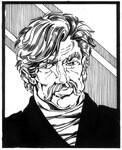
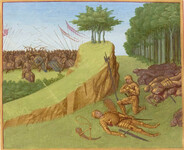
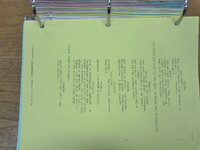
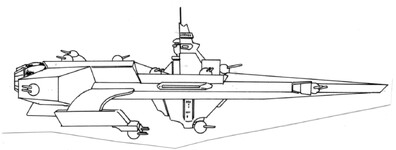
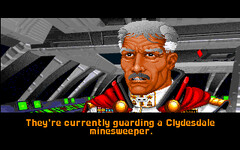
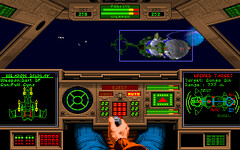
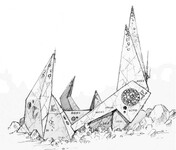
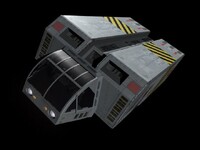
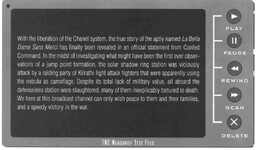
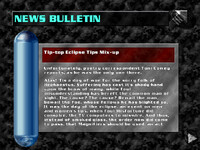
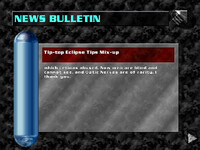
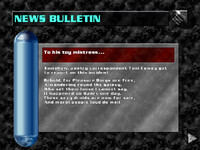
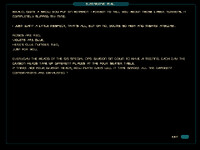
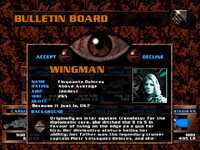
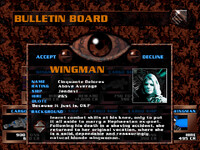
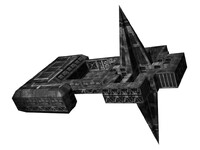
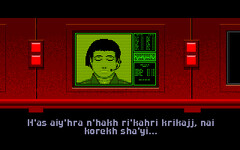
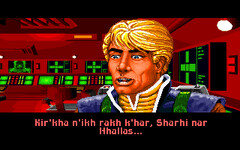
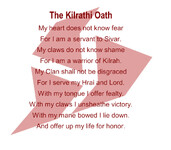
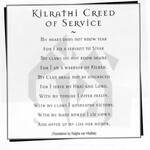
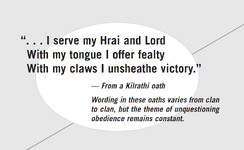
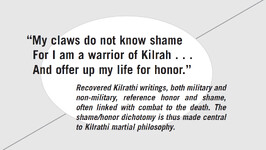
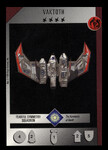
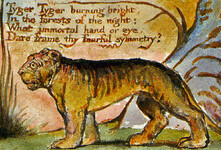

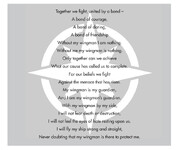

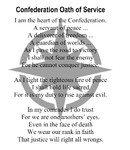
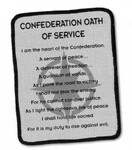
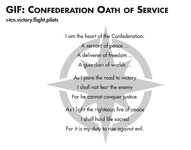
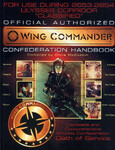
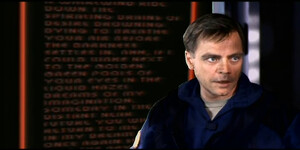
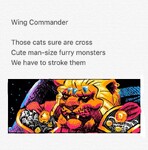
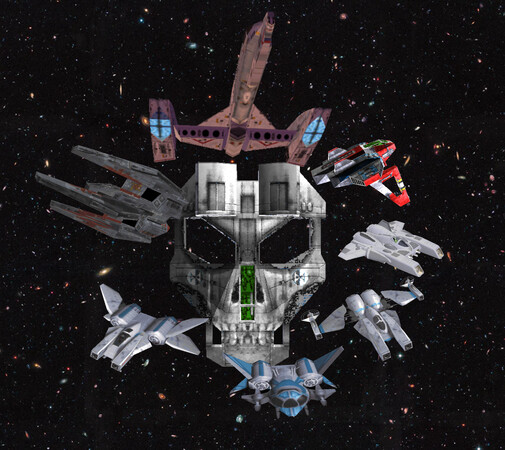
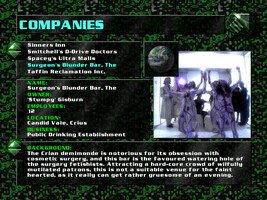
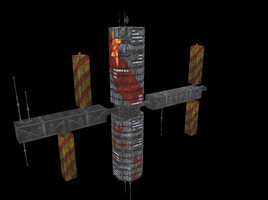

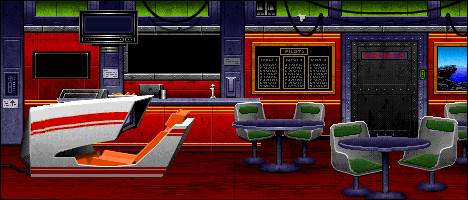
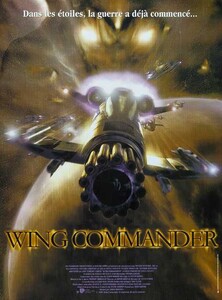
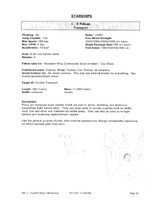
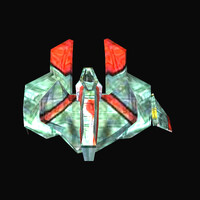


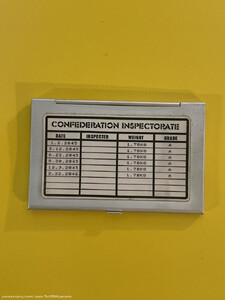

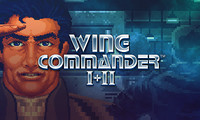
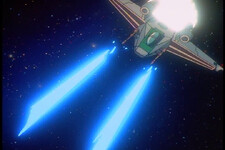

Follow or Contact Us